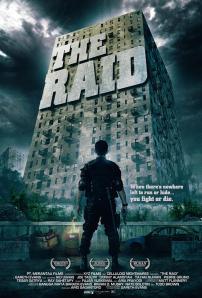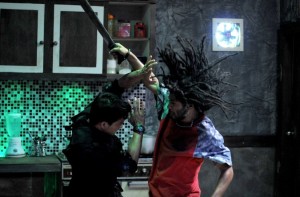(Gareth Evans, 2011, Indonesia/USA/France)
 Critics sometimes refer to contemporary action cinema as possessing a “video-game aesthetic”, usually intending the term pejoratively to denounce a movie’s prizing of violent fight scenes and visual spectacle over seemingly more important filmic elements such as plot and character development. Video games, after all, can never be art (according to the late Roger Ebert), and thus utilizing their inherent action-oriented nature as a point of reference for a certain brand of genre film is a way of delegitimizing those films, forever branding them as inferior to ‘serious’ pictures. The end result is that a number of action films, particularly those of the summer blockbuster variety, have attempted to measure up to these so-called prestige pictures, employing knotty, sometimes incoherent narrative structures and complex, psychologically-damaged protagonists in a valiant effort to be taken seriously – often to the detriment of their overall aesthetic. The recent trend in comic-book adaptations toward a more gritty, ‘realistic’ approach is the most significant example of this, but it’s just one of several.
Critics sometimes refer to contemporary action cinema as possessing a “video-game aesthetic”, usually intending the term pejoratively to denounce a movie’s prizing of violent fight scenes and visual spectacle over seemingly more important filmic elements such as plot and character development. Video games, after all, can never be art (according to the late Roger Ebert), and thus utilizing their inherent action-oriented nature as a point of reference for a certain brand of genre film is a way of delegitimizing those films, forever branding them as inferior to ‘serious’ pictures. The end result is that a number of action films, particularly those of the summer blockbuster variety, have attempted to measure up to these so-called prestige pictures, employing knotty, sometimes incoherent narrative structures and complex, psychologically-damaged protagonists in a valiant effort to be taken seriously – often to the detriment of their overall aesthetic. The recent trend in comic-book adaptations toward a more gritty, ‘realistic’ approach is the most significant example of this, but it’s just one of several.
Every once in a while, though, an action movie forgoes its weighty ambitions and simply embraces its video game roots. The Raid: Redemption is one of those movies. Directed by Welshman Gareth Evans, but produced and filmed in Indonesia, it is a refreshingly unpretentious affair, almost entirely set within a single apartment block in Jakarta’s slums and wholly focused on an elite polite squad that enters the building in an ultimately disastrous attempt to kill a local crime lord. Taking a level-by-level approach to the action, in which each successively higher floor contains a higher number of increasingly dangerous criminals, it thus emulates the structure of the most basic first-person shooter, with the final boss ensconced within the penthouse at the top – a deceptively simple narrative framework, remarkably effective and perfectly executed.
 And yet the film’s spartan plot is little more than an excuse for Evans to showcase his stunning choreography and kinetic cinematography. Featuring the traditional Indonesia martial art of pencak silat – a kind of performance fighting skill – the movie contains no less than half a dozen sequences of hand-to-hand combat, climaxing with a lengthy three-way battle that is both impressive and exhausting. Evans’ approach to these scenes is nothing revelatory, but by using long, drawn-out takes instead of quick, choppy editing, he manages to make handheld camerawork (the ever-maligned shaky-cam) feel dynamic without being incomprehensible. Swooping around and between combatants as they wield fists, feet, knees, elbows, heads and a wide assortment of weapons in a gruelling struggle to inflict the most damage, Evans’ camera often feels like a third-party spectator just trying to get out of the way. There are also quite a few sequences of gunplay, but there’s no John Woo poetry to them – just unrelenting carnage until the ammo runs out and the fisticuffs begin.
And yet the film’s spartan plot is little more than an excuse for Evans to showcase his stunning choreography and kinetic cinematography. Featuring the traditional Indonesia martial art of pencak silat – a kind of performance fighting skill – the movie contains no less than half a dozen sequences of hand-to-hand combat, climaxing with a lengthy three-way battle that is both impressive and exhausting. Evans’ approach to these scenes is nothing revelatory, but by using long, drawn-out takes instead of quick, choppy editing, he manages to make handheld camerawork (the ever-maligned shaky-cam) feel dynamic without being incomprehensible. Swooping around and between combatants as they wield fists, feet, knees, elbows, heads and a wide assortment of weapons in a gruelling struggle to inflict the most damage, Evans’ camera often feels like a third-party spectator just trying to get out of the way. There are also quite a few sequences of gunplay, but there’s no John Woo poetry to them – just unrelenting carnage until the ammo runs out and the fisticuffs begin.
Fittingly, the movie only really falters when the narrative starts to intrude upon the action. Though none of the characters aside from the lead, Rama (played by pencak silat expert Iko Uwais), are given any backstory (and Rama’s is only the ‘clichéd pregnant wife at home’ trope), Evans still tries to tell a somewhat ambitious tale of police corruption and estranged brothers – one that, frankly, gets in the way of the spectacular fight scenes. Subsequently, the plot ends up turning away from its brilliantly economical concept, becoming a generic crime story that simply isn’t borne out by the performances. Though both action cinema and video games have, in recent years, attempted to respond to criticism of mindlessness and simplicity by becoming more convoluted and grandiose, Evans would’ve been better served in keeping his film sparse and singular – the quality of his action sequences and fight choreography is enough to make up for any perceived lack of importance.
Still, this is one of the best pure action (read: not mixed with other genres) films in recent memory, solely owing to Evans’ skill as a visual craftsman and action choreographer. The Raid: Redemption is a grimy, repugnant affair, set in a squalid apartment complex and chock full of some of the most realistic and disgusting violence you’re likely to see on screen, but thanks to its fluid camerawork, rhythmic fight scenes, and uncluttered narrative, it resembles the cadence of classic Hong Kong action cinema more than any contemporary equivalent. Evans doesn’t have Woo’s knack for gunplay, but his fight choreography might be even better, and his cinematography is just as expressive. The Raid might have a video-game aesthetic, but that’s precisely what it’s aiming for.
One comment